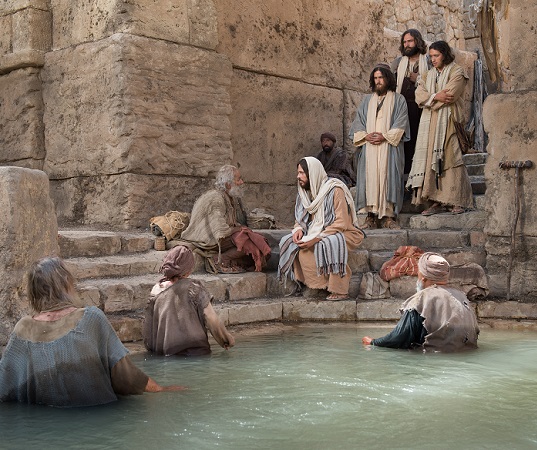Jesus & the Law – on honoring the Sabbath … (11/27/18)
The Law was explicitly clear that no work was to be done on the Sabbath – the seventh day of every week; a day that was to be revered – essentially with rest or ceremony (see Exodus 16:29, Exodus 20:8-10, Exodus 23:12, Exodus 25:30, Exodus 34:21, Exodus 35:2-3, & Numbers 28:9-10 et al). Of course, there was great debate as to just what constituted “work” for this regulation,1 and so Jesus (unsurprisingly) had quite a bit to say about the matter – proclaiming quite boldly (and at the time quite heretically) that “the Sabbath was made for man, not man for the Sabbath” (see Mark 2:27 – also Matthew 12:8 & Luke 6:5) and that “it is lawful to do good on the Sabbath” (see Matthew 12:12 – also Mark 3:1-5 & Luke 6:6-10) – and this, regardless of what is being done. And he was consistently brazen about the matter as well – calling out the Pharisees’ legal hypocrisy after they accused his disciples of violating the Sabbath by plucking heads of grain in a field (referencing 1 Samuel 21:1-6 in the process – see Matthew 12:1-8, Mark 2:23-28, & Luke 6:1-5), and doing the same when the Pharisees criticized him for healing the injured & the ill on the Sabbath in their synagogues (see Matthew 12:9-13, Mark 3:1-6, Luke 6:6-11, Luke 13:10-17, Luke 14:1-5, John 5:5-17, & John 7:21-24).
“If one of you has a donkey or an ox that has fallen into a well on a Sabbath day, will you not immediately pull him out? … You hypocrites! Indeed, does not each of you on the Sabbath untie his ox or donkey from the manger, and lead it to give it water? And so ought not this woman be equally set free from bondage on the Sabbath?’ And after this all his opponents were put to shame, and the crowd rejoiced at the wonderful things he was doing.” ~ Luke 14:5 & Luke 13:15-17

………………………………………………………..
1 Violating this commandment was punishable with death (see Exodus 31:14-15) and as such the Jewish priests and scribes of that age went to great lengths to explicitly define every conceivable deed that would qualify as “working” on the Sabbath. Jeremiah 17:21-22 was sometimes cited as prohibiting the “carrying of any burden” on the Sabbath, and yet the majority of Jewish scholars were eventually in agreement that the symmetry between Genesis 2:1-3 & Exodus 31:1-11 meant that “work” (the Hebrew melakha in these passages) pertained to anything involving creativity or creation or exercising dominion over one’s surroundings. As such, Jewish authorities ended up listing 39 different categories of activity that qualified as “work” in relation to the Sabbath prohibition thereof (see Mishnah Shabbat 7:2) – among them planting, plowing, reaping, gathering, threshing, winnowing, grinding, kneading, cooking, baking, laundering, combing, dyeing, spinning, weaving, sewing, writing, erasing, building, demolishing, igniting, extinguishing, & carrying.




 ;
;